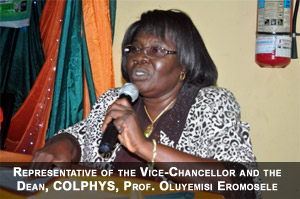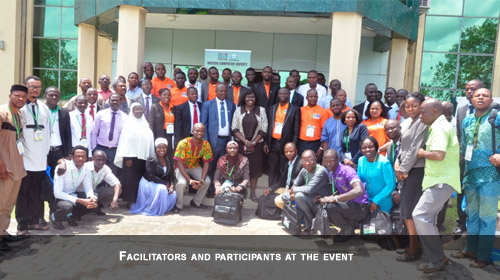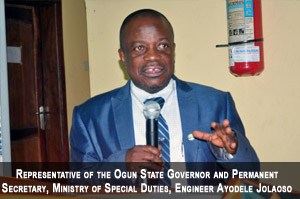
The innovative use of information technology in providing low-cost solutions to support strategies in advancing the world economy has been stressed. The Vice-Chancellor, Professor Olusola Oyewole, stated this at the maiden Applied Information Technology (AIT) 2015 International Conference, themed, “Emerging Trends in Applied Computing”, held in the University.
The Vice-Chancellor said the conference was an international forum for the presentation of technological advances and research results in the fields of Computer Science, Information Technology and other allied research, adding that it was also opening a window for researchers within and outside computing to adapt to the paradigm. According to him, “The conference would bring together leading researchers, engineers and scientists from around the world. We warmly welcome authors who submitted their research papers to AIT 2015, to share the valuable experiences with fellow scientists and scholars around the world”.

Represented by the Dean, College of Physical Sciences (COLPHYS), Professor Oluyemisi Eromosele, the Vice-Chancellor stated that FUNAAB was known for knowledge for development, while charging all participants to explore the rich components of the conference to develop strategies that would uncover issues within the particular input areas like tele-medicine and e-health, educational technologies, e-governance, among others.
Delivering a keynote address titled, “From Big Data to Big Impact e-Governance”, the Vice-Chancellor, Covenant University, Professor Charles Ayo, stated that data is now the most valuable business resource, adding that it is the new ‘currency’ of the world. Professor Ayo, who was represented by the University’s Director of Academic Planning, Dr. Olawande Daramola, described Big Data as datasets, whose size are beyond the ability of typical database software tools to capture, store, manage, and analyze. He said further that Big Data are too big to be handled and analyzed by traditional database protocols or data that is too big, moves too fast, or does not fit into conventional database architectures.
He mentioned the Seven V’s of Big Data to include Volume, Variety, Variability, Velocity, Veracity, Value and Visualisation, adding that Big Data for development was about turning imperfect, complex, often unstructured data into actionable information for the purpose of national development. Explaining what is e-governance, the don said that it entailed the use of ICT for the delivery of government services to the citizens, as well as the exchange of information communication transactions, integration and co-ordination of government subsystems for efficiency.
He said e-governance had failed largely in the sub-Sahara Africa, due to poor ICT infrastructure, poor finance, poor political leadership, poor organisation and communication. He stressed that in an increasingly digitalised world, data was next to oxygen and to survive and thrive, the mastery and proactive application of Big Data for governance would be essential. Professor Ayo noted that this may be the only way to improve the quality of life of the people and positively affect the society.
While declaring the conference opened, the Governor of Ogun State, Senator Ibikunle Amosun, stated that the choice of the Ogun State for the conference was not a surprise, adding that Ogun State indigenes were pioneers in many human endeavours such as Medicine, Accountancy, Law, Politics, Religion, Commerce and Information Technology. Represented by the Permanent Secretary, Ministry of Special Duties, Engineer Ayodele Jolaoso, the Governor said that the conference’s theme could not have been more apt as Applied Computing focuses on the application of classic and leading edge computing concepts and technologies to proffer solutions to the problems and challenges confronting human existence.
He noted that the world was already knitted into one economic unit through the Internet and the social media, adding that it was the reason why the world was re-christened a global village. He further said that “considering the limitless advantages the computer and its uses at home, in the community, in industry, our national economy, the opportunity of local and international integration that this conference avails is more than necessary”. Senator Amosun, therefore, called on the populace to continue to avail themselves of the emerging trends in IT so as not to be caught unawares of the opportunities found in the New Media. He stressed that his administration would not rest on his oars but would continue to leverage on activities that would improve its developmental heights in line with the mantra, “Mission to Rebuild”, noting that Ogun State is the industrial hub and tertiary institutions capital of Nigeria.
The Chairman, Local Organising Committee (LOC) for the conference, Professor Adio Akinwale, stated that computer scientists needed to work hard to keep pace with developments in information technology. Professor Akinwale, who was the pioneer Head, Department of Computer Science, added that the interaction of computer scientists with other disciplines had largely been accepted as a means of developing information technologies the world-over.

The Chairman, Nigeria Computer Society (NCS), Ogun State Chapter, Dr. Bukola Onashoga, enlightened participants on the essence of the theme, saying that it was meant to educate the participants on the uses of advanced information technology in order to make better decisions in all spheres of life. According to her, “The main focus of this gathering was to allow both professionals and academics to focus on the high value benefits of information technology”, saying the conference was dedicated to ease increased opportunities for cross-fertilisation across Computer Science and other disciplines because it remained the driving force for advances and breakthroughs in other fields.
Present at the event were the President, NCS, Professor Adesola Aderounmu who was also the Chairman, Opening Ceremony; the Acting Head of Computer Science Department, Dr. Olusegun Ojesanmi; amongst others.
